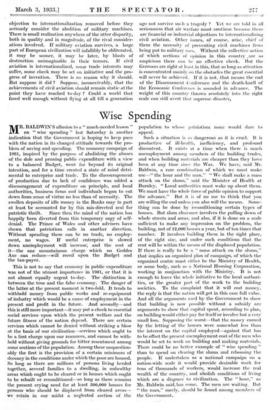Wise Spending
MR. BALDWIN'S allusion to a " much-needed lesson " on " wise spending " last Saturday is another indication that the Government is hoping to keep pace with the nation in its changed attitude towards the pro- blem of saving and spending. The economy campaign of 1931, inspired by the purpose of abolishing the abuses of the dole and pruning public expenditure with a view to a balanced Budget, went far beyond its original intention, and for a time created a state of mind detri- mental to enterprise and trade. To the discouragement of production due to lack of confidence was added a discouragement of expenditure on principle, and local authorities, business firms and individuals began to cut down from sense of virtue no less than of necessity. The swollen deposits of idle money in the Banks may in part at least be accounted for by this mis-directed zeal for patriotic thrift. Since then the mind of the nation has happily been diverted from this temporary orgy of self- denial. The Prince of Wales and other advisers have shown that patriotism calls in another direction. Without spending there can be no trade, no employ- ment, no wages. ' If useful enterprise is ' slowed down unemployment will increase; and the cost of it—the one mountainous charge which no Geddes Axe can reduce—will recoil upon the Budget and the tax-payer.
This is not to say that economy in public expenditure was not of the utmost importance in '1931, or that it is not almost equally urgent to-day. The distinction is between the true and the false economy. The danger of the latter at the present moment is two-fold. It tends to withhold money from public works and re-equipment of industry which would-be a cause of employment in the present and profit in the future. And secondly—and this is still more important—it may put a check to essential social services upon which the present welfare and the future fitness of the nation depend. There are certain services which cannot be denied without striking a blow at the basis of our civilization—services which ought to be a first -charge upon our resources, and cannot be with- held without giving grounds for bitter resentment among some sections of the population. Among these unquestion- ably the 'first is the provision of a certain minimum of decency in the conditions under whichthe poor are housed. So long as there are millions of persons living herded together, several families to a dwelling, in unhealthy areas which ought to be cleared or in houses which ought to be rebuilt or reconditioned—so long as there. remains the present crying need -for at least 500,000 houses for persons who should be displaced from cleared areas— we retain in our midst a neglected section of the
population to whose patriotism none would dare to appeal.
Such a situation is as dangerous as it is cruel. It is productive of ill-health, inefficiency, and profound discontent. It exists at a time when there is much unemployment among members of the building trades, and when building materials are cheaper than they have been at any time since the War. We have; said Mr. Baldwin, a rare combination of which we must make use--" the hour and the man." " We shall make a mass attack on the slums," said the Minister of Health at Burnley. " Local authorities must wake up about them. We must have the whole force of public opinion to support the advance." But it is of no use to think that you arc willing the end unless you also will the means. Some- thing can be done by reconditioning certain. types of houses. But slum clearance involves the pulling down of whole streets and areas, and also, if it is done on a scale sufficient to make any impression on the problem, the building, not of 12,000 houses a year, but of ten times that number. It involves building them in the right place, Of the right size, and under such conditions that the rent will be within the means of the displaced population. If there is really to be a " mass attack on the slums," that implies an organized plan of campaign, of which the organized centre must either be the Ministry of Health, or some body, such as a National Housing Corporation, working in conjunction with the Ministry. It is not enough to leave the whole initiative to the local authori- ties, or the greater part of the work to the building societies. To the complaint that it will cost money, the reply is that the nation will get in this case full value. And all the arguments used by the Government to show that building is now possible without a subsidy are arguments to show that capital spent, according to plan, on building would either pay for itself or involve but a very small loss. Supposing the worst—that the money earned by the letting of the houses were somewhat less than the interest on the capital employed—against that has to be offset the present unemployment cost of the men who would be set to work on building and making materials. There could be no better example of " wise spending " than to spend on clearing the slums and rehousing the people. If undertaken as a national campaign on a nation-wide scale -it would provide desirable work for tens of thousands of workers, would increase the real wealth of the country, and aboligh conditions of living which are a disgrace to civilization. The " hour," as Mr. Baldwin said, has come. The men are waiting. But "the man," surely, should be foUnd among members of the Government. -


















































 Previous page
Previous page